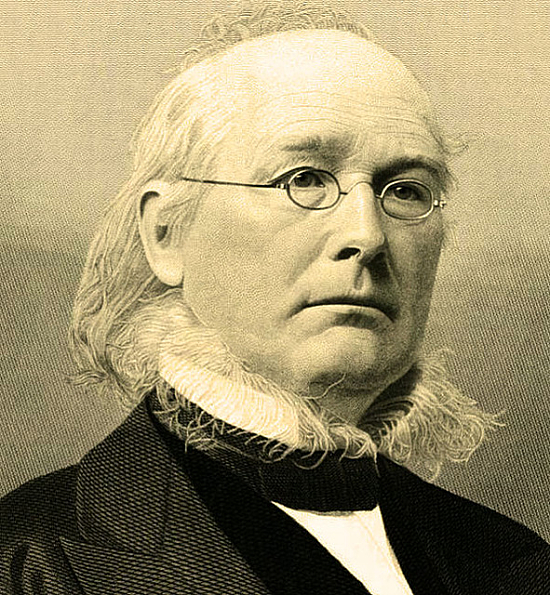
Home
|
Aesthetic
Realism seminar:
How Do We Want to
Express Ourselves?
with a
discussion about Horace Greeley, part 2
By Michael Palmer
Expression For and Against the World
One of the important
persons in the history of America is Horace Greeley, founder and editor
of the newspaper The Tribune, who lived from 1811 to 1872.  As a powerful force against slavery and unfair economics, Greeley used
the printed word to have people’s lives better. He stands for the
ethical purpose editors need and should have today—to enable people to
meet what they most need for their lives. As I write this, I
can’t think of anything people need more to know than the knowledge of
Aesthetic Realism. As a powerful force against slavery and unfair economics, Greeley used
the printed word to have people’s lives better. He stands for the
ethical purpose editors need and should have today—to enable people to
meet what they most need for their lives. As I write this, I
can’t think of anything people need more to know than the knowledge of
Aesthetic Realism.
In December, 1974, Eli Siegel wrote an issue of The Right of Aesthetic Realism to Be Known titled “Letter to Horace Greeley.” In sentences beautiful and exact, he said:
- You, Horace Greeley were the editor
most welcoming of new causes in the early years of Andrew Jackson and
the last years of Abraham Lincoln. You were for the French
socialist Fourier; you were for the intellect of Margaret Fuller; you
were for abolition; you were for “association” among laborers; you were
for the justice in the mind of Abraham Lincoln; and also you were for
the good sense of the American farmer.
Horace Greeley’s feeling for people and what would be just to them had
its beginning on the rural farms of New England. He was born in
Amherst, New Hampshire. His parents were farmers and very poor
and Greeley had to help in the fields at a very young age.
But he found time to be interested in things. In his
lecture Aesthetic Realism and Expression, Mr. Siegel writes:
- The question of expression has to do
with how much we take in and how we take it in. If we cannot
respond to what comes to us, we can never express ourselves.
Horace
Greeley is important because, to a large degree, he responded to what
came to him. With his mother’s encouragement he read the Bible at
the age of five and later studied the poets Lord Byron, Robert Burns,
and William Shakespeare. He read any kind of newspaper or
periodical he could find.
Greeley cared for words and
how they could be placed on a page and be useful to people. When
he was only 15, he became an apprentice printer for a journal in East
Poultney, Vermont. Then in 1831, at the age of 20, with only a
few dollars in his pocket and all his possessions on his back, Greeley
came to New York City to begin a career that was to have a great and
lasting meaning for the City and Nation.
In New York he found a city
of great energy but also of tremendous economic misery.
There were cholera plagues in the 1830’s in which many people died, and
an economic depression in 1837. Nearly one-fifth of the
population of the city—about 80 thousand people—were on some type of
relief or charity. Greeley saw what people were made to endure as
horribly unjust, and in various publications he expressed his objection
with deep feeling. Then in 1841, with no experience as either
editor or publisher of a daily paper, he began the New York
Tribune. He wrote its proud, beautiful purpose in the first issue:
- The Tribune…will labor to advance the interest of the People and to promote their moral, social and political well-being.
Greeley
was determined to back up that purpose even if it made him unpopular
with political and influential people, and I respect him
tremendously. He wrote:
- While I remain where I am I cannot
afford to despise myself. Besides I owe what little chance for
usefulness that I may have to the impression that I do no man’s
bidding, but speak my own thoughts.
Greeley’s
writing had a wide effect. As Henry Luther Stoddard pointed out
in his biography, Horace Greeley, Printer, Editor Crusader ,
“Even Capitalists read Greeley. They resented his ideas, yet they
respected the man they could never control.” Greeley was an early
opponent of slavery and spoke out strongly in editorials against the
U.S. war with Mexico which he rightly felt was designed to grab Texas
and extend slavery to that territory. He was also intensely
critical of what he likened to slavery—men, women, and even children
working in New England mills under terrible, inhuman conditions for
little money. He wrote about:
- The errors, crimes and miseries that have made this earth a place of hell for too many….
And he said there would be:
- a
reign of truth….thriftless Pretense and Slavery shall no longer prosper
while Labor vainly seeks employment even at a scant living wage.
As The Tribune began to prosper, Greeley
sold most of his shares in the newspaper to his employees for little or
no money. And in one of the most beautifully surprising things,
though he was technically the head of the newspaper, Greeley
proceeded to organize the printers at the paper into a union and was
selected as their first president. Stoddard writes:
- Greeley
did not stop there. He became the printer’s union’s first
negotiator for collective bargaining and agitated for a fixed scale of
wages and hours for printers. In six months time he had the union
established in most printing offices.
To
Part 3, click here
© Michael
Palmer
|
|